When selecting CRM software, cost is frequently a key consideration. At first glance, Monday.com CRM may appear more budget-friendly than Close CRM. However, we’ll break this down to see if that’s actually the case. As your business expands and your sales needs become more sophisticated, additional sales CRM features become crucial.
In this CRM comparison, we’ll examine the key differences between Monday CRM and Close CRM, including their features and pricing plans. We’ll also introduce Pipeline CRM as a viable alternative to Monday CRM and Close CRM, especially for businesses seeking a long-term solution that is specific to sales and pipeline management.
What is Monday CRM?
Monday CRM, also known as Monday.com sales CRM, tackles common sales challenges for small and medium businesses. They operate mainly in the professional services, financial services, real estate, and consumer goods industries.
Monday CRM enables sales teams to manage the entire sales cycle, from pre-sales activities like lead generation and qualification to post-sales support. It offers a comprehensive suite, including robust features for lead and deal management, account and contact management, and sales operations.
Top Features
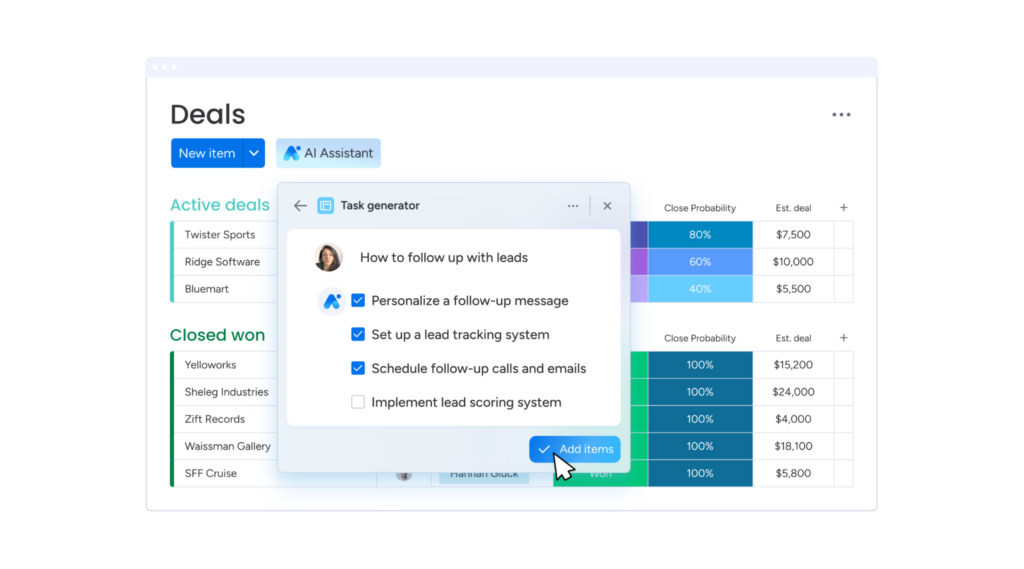
Among its many features, Monday.com CRM emphasizes these core selling points:
- AI-enhanced sales tools: leverage AI to automate task generation, craft personalized outreach emails, and create custom calculation formulas for in-depth sales reporting analysis.
- Automated sales processes: streamline repetitive sales activities by automating lead assignments to sales reps and setting reminders for upcoming events.
- Vast integration options: seamlessly connect Monday CRM with over 150 sales, marketing, and team management applications, including Aircall, DocuSign, Miro, Calendly, and QuickBooks.
- Comprehensive email solution: save time by sending mass emails to prospects. You can monitor their performance with detailed tracking of open ratios, conversion rates, and more.
- CRM on the go: manage your sales pipeline from anywhere, whether your reps are in the field or at the office via the mobile CRM app.
Pros and Cons
Monday CRM boasts several impressive sales features, but user experiences vary. While some users praise its ability to manage leads effectively, others express disappointment with its limited workflow automation and reporting capabilities.
As one G2 review highlights: “It has helped us keep on top of our contacts and customers and all of the dialogue around each quotation” (source). However, other users have noted shortcomings in these areas: “Some of the built-in automation is limited.” (source) and “For users who heavily rely on in-depth reporting and analytics, Monday CRM may fall short of expectations” (source).
What is Close CRM?
Close CRM positions itself as a user-friendly and responsive CRM solution. Unlike Monday CRM’s industry-specific focus, Close targets a broader audience of small businesses and startups.
Close CRM prioritizes specific sales challenges, for example, streamlining fast-paced sales activities, automating repetitive tasks, and fostering strong customer relationships.
Top Features
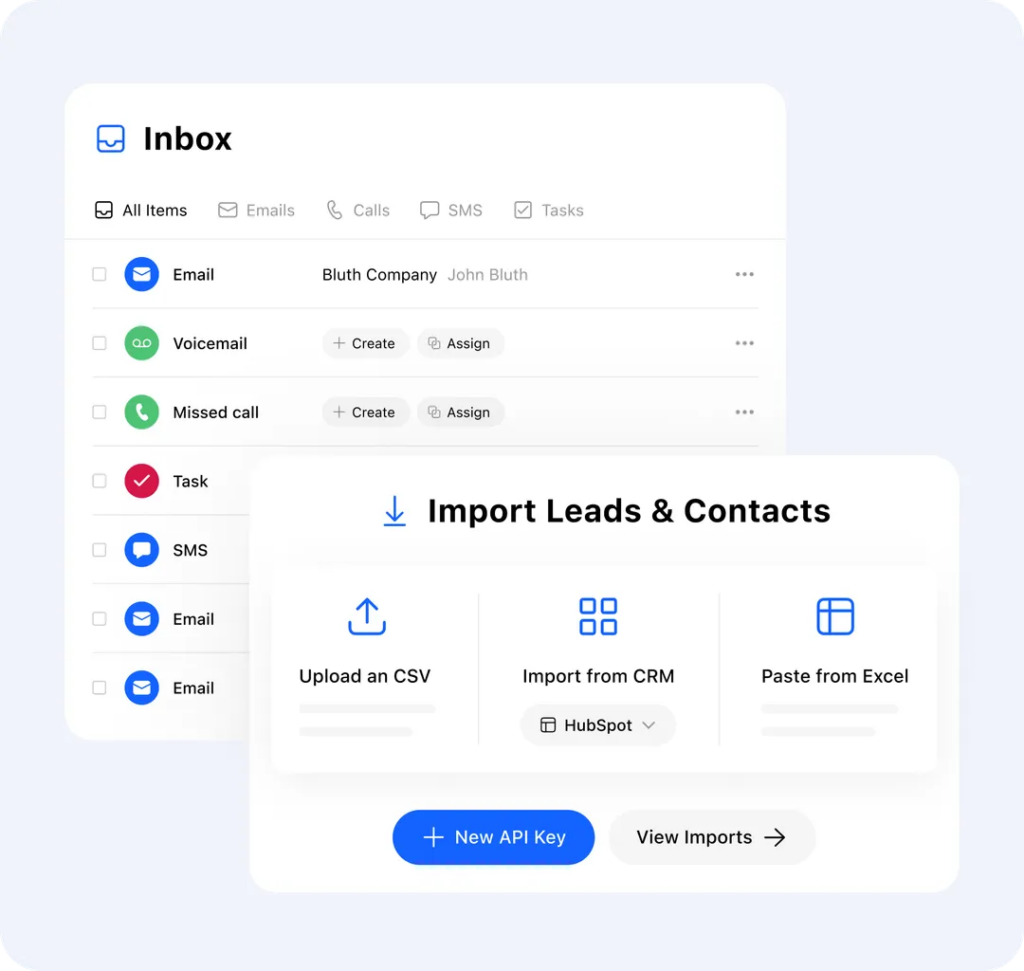
Close CRM is particularly known for these standout features:
- Centralized communication: seamlessly manage all internal and external communications, including emails, calls, SMS, and team collaborations.
- Advanced contact management: use the built-in search filter to locate contacts, conversations, or key phrases quickly.
- Customizable views: create dynamic smart views to visualize the sales data that matters most to your team.
- AI-powered tools: utilize custom GPT to generate prospecting lists, create meeting agendas, summarize call transcriptions, and draft effective emails.
Pros and Cons
Close CRM excels in communication management, offering built-in calling and SMS features to complement its email channels. This has significantly boosted sales productivity for many teams.
As one user noted, “Each of our reps makes more than 50 calls a day. For a call-heavy sales team like ours, Close really shines” (source). However, there is still room for improvement, with some users reporting minor glitches, such as issues with the mobile app during calls: “The mobile app for close creates certain issues while calling the leads, this is a small glitch at a time” (source).
Monday.com CRM vs. Close CRM: Sales CRM Features
Now that you have an overview of Monday CRM and Close CRM, let’s compare their features. The list below highlights the major differences between the two CRM solutions.
| Monday CRM | Close CRM | |
| Multiple pipelines | Unknown | Yes |
| Custom fields | Unknown | Yes |
| Advanced data safeguard | Mandatory fields and duplicate warning | Unknown |
| Lead scoring | Built-in | Unknown |
| Sales automation | Focus on sales reminders and notifications | Focus on email sales outreach |
| Sales forecasting | Yes | Unknown |
| Team activity reporting | Yes | Yes |
| Email drip campaign | Unknown | Yes |
| Mass email | Yes | Yes |
| Email tracking | Yes | Yes |
| Calling and SMS | Through app integrations | Built-in |
| Mobile CRM app | Yes | Yes |
| Quotes and invoices | Built-in | Through app integrations |
| Popular integration options | Gmail, Outlook, Microsoft Teams, Slack, Mailchimp, Excel, DocuSign, and PandaDoc | Gmail, Microsoft 365, Hubspot, Calendly, Zoom, Zapier, Close GPT, and Clay |
Our features verdict: Close CRM stands out by offering more comprehensive sales features than Monday CRM, especially for teams focused on enhancing their sales outreach. With built-in call and SMS capabilities, along with email drip campaigns, Close CRM allows you to streamline and scale your outreach efforts, helping you meet your sales goals more effectively.
Monday CRM vs. Close CRM: Pricing
While both CRMs are designed for small to medium-sized businesses, their pricing structures and seat packages vary significantly. Monday CRM generally offers a lower-cost option, while Close CRM positions itself as a premium CRM solution.
Monday CRM Pricing Plans
Monday CRM offers three paid tiers priced at $12, $17, and $28 per seat per month (billed annually). The features included in each tier vary, with the lowest tier focusing on contact management rather than sales features. For enterprise-level features, you’ll need to contact the sales team for a custom quote.
While there’s no permanent free plan, eligible students and nonprofits can qualify for a free version. Additionally, a 14-day free trial is available for all users.
It’s important to note that Monday.com CRM requires a minimum purchase of 3 seats, and the packages are based on predefined team sizes. Small team options start with 3 or 5 seats, with additional seats available in increments of 5. This means that if your sales team consists of 8 sales reps, you’ll need to pay for 10 seats even though you only use 8. The per-seat pricing remains consistent, regardless of team size.
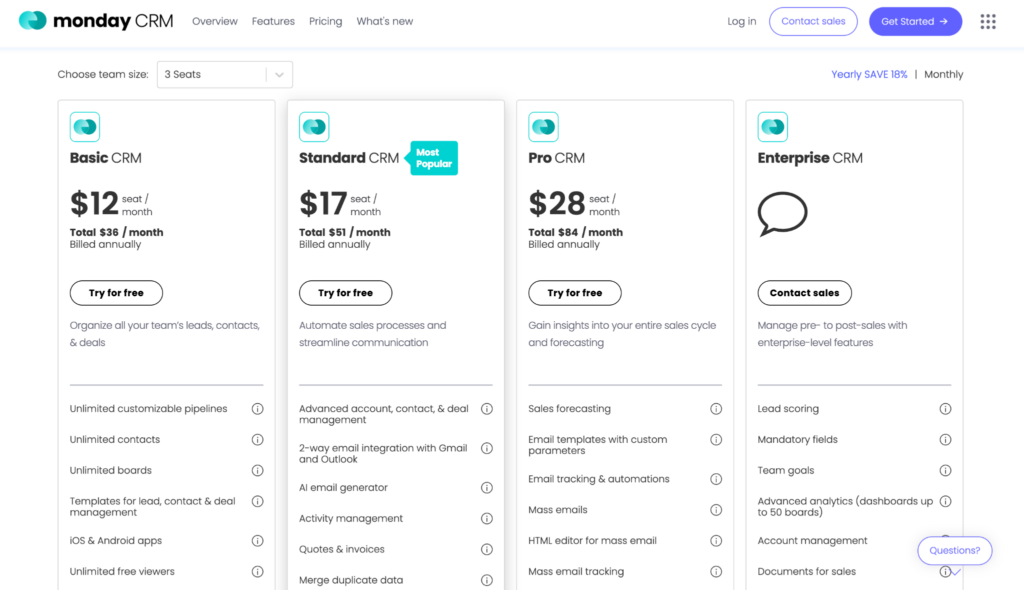
Close CRM Pricing Plans
Close CRM offers three paid plans: $49, $99, and $139 per user per month (billed annually). You can purchase seats individually to match the size of your sales team.
While there’s no free plan, you can try Close CRM for 14 days for free. If you decide to subscribe, the team will assist with migrating your data from your existing CRM system free of charge.
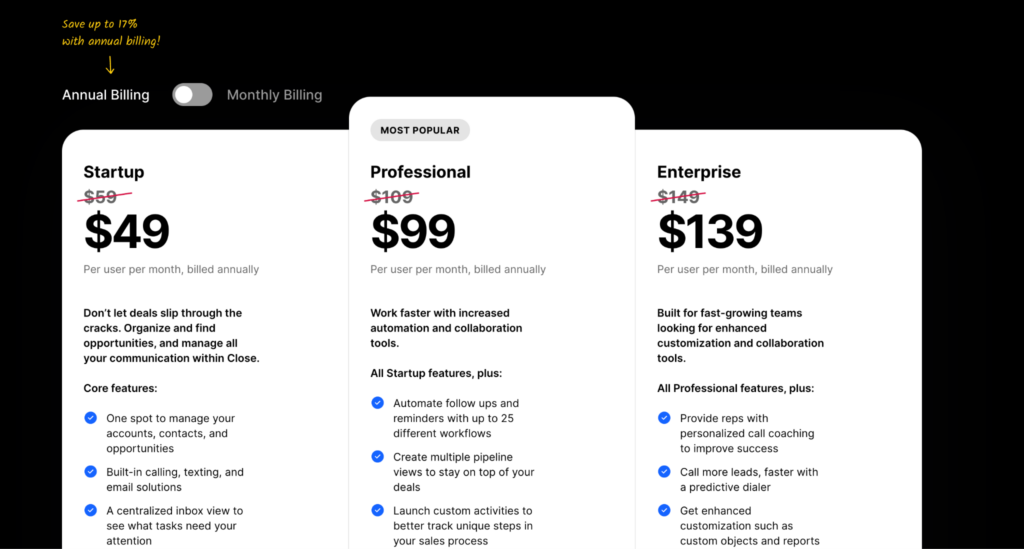
Our pricing verdict: Monday CRM offers a more budget-friendly solution for small businesses than Close CRM. At nearly half the cost of Close CRM’s lowest tier ($49), Monday CRM’s premium plans start at just $28 per user per month. Even with the minimum purchase of three seats ($84), you can equip three of your sales representatives with Monday CRM, providing more comprehensive support to your people than a single seat of Close CRM’s mid-tier plan ($99).
Now, does this mean Monday CRM is a better CRM software than Close CRM? To answer that, let’s consider the features, benefits, and costs of both CRMs.
Monday CRM vs. Close CRM: Which is the Better Choice?
After comparing both tools, it’s clear that Monday CRM and Close CRM cater to different business needs.
For small to medium-sized businesses heavily focused on sales outreach through emails, phone calls, and SMS, Close CRM is the stronger option. While it comes at a higher cost than Monday CRM, it provides greater flexibility and advanced features to help sales teams attract new customers more effectively.
However, if your business doesn’t heavily rely on email, phone, or text outreach and you’re looking for a more comprehensive sales CRM solution, Monday CRM may be a better fit. This is particularly true for larger teams, as Monday CRM is more affordable for businesses with multiple salespeople.
Pipeline CRM: The Best CRM for Sales Pipeline Management
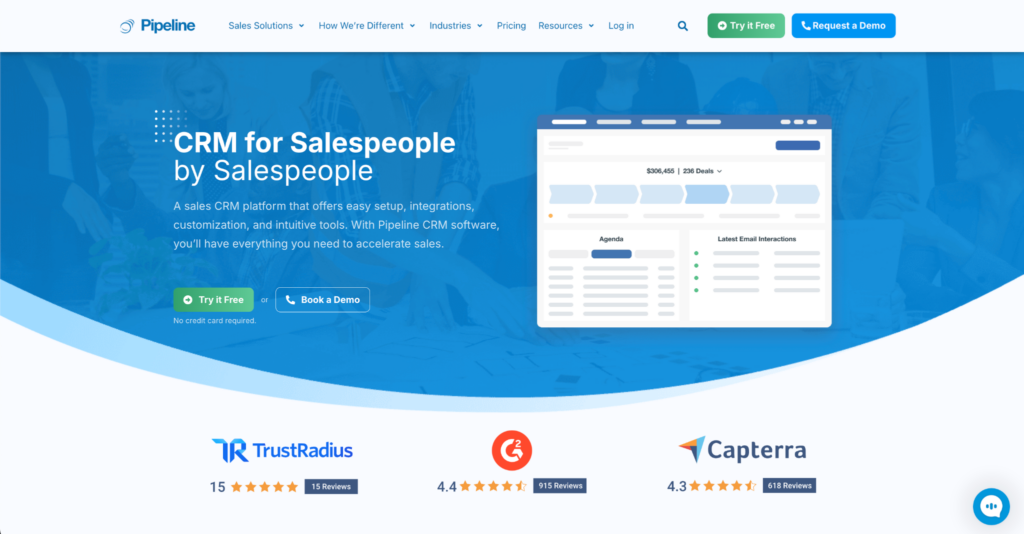
When selecting a CRM, it’s crucial to consider not only your current needs but also how they might evolve as your business grows. Monday CRM is suitable for covering basic sales processes, but it may not scale well for more complex and advanced sales operations. Conversely, Close CRM might be too costly for a new business, even though it offers a more robust, long-term solution for teams with growing CRM needs.
Is there a middle ground? Yes, Pipeline CRM provides a balanced solution between Monday CRM’s affordable pricing and Close CRM’s advanced features.
Pipeline CRM Features
Here are some reasons why Pipeline CRM is the best CRM for small to medium-sized businesses, especially those in construction, agencies, logistics, and manufacturing:
- User-friendly design
Benefit from a familiar Excel-inspired design with drag-and-drop functionality and customizable table styles, while easily sorting and filtering data to display only relevant information.
- Data integrity
Maintain data accuracy with required and conditional fields, conditional formatting, and advanced de-duplication.
- Advanced automation
Automate recurring deals, suggest ‘next steps’ for changed deal statuses, and implement other advanced automation features beyond traditional email sequences.
- AI-Powered email assistance
Craft compelling emails directly within Pipeline CRM using our built-in AI email assistant, with customizable prompts to tailor content to your specific needs.
Seamlessly connect Pipeline CRM to popular sales and marketing applications, including phone solutions (Aircall, CallRail, etc.), accounting software (QuickBooks), marketing automation (Mailchimp and Customer.io), and more.
Don’t just take our word for it. Here’s how one of our customers describes their experience of using Pipeline CRM.
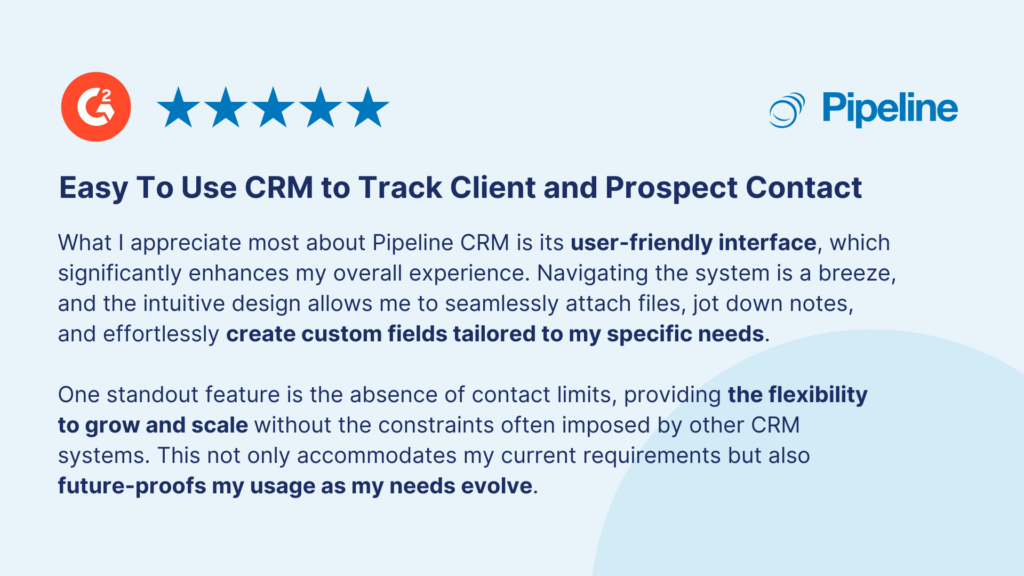
Pipeline CRM Pricing
Pipeline CRM offers four paid plans, including a custom option for enterprise-level businesses. Pricing starts at $25, $33, and $49 per seat per month when billed annually. You can explore its powerful and simple features with a 14-day free trial before committing.
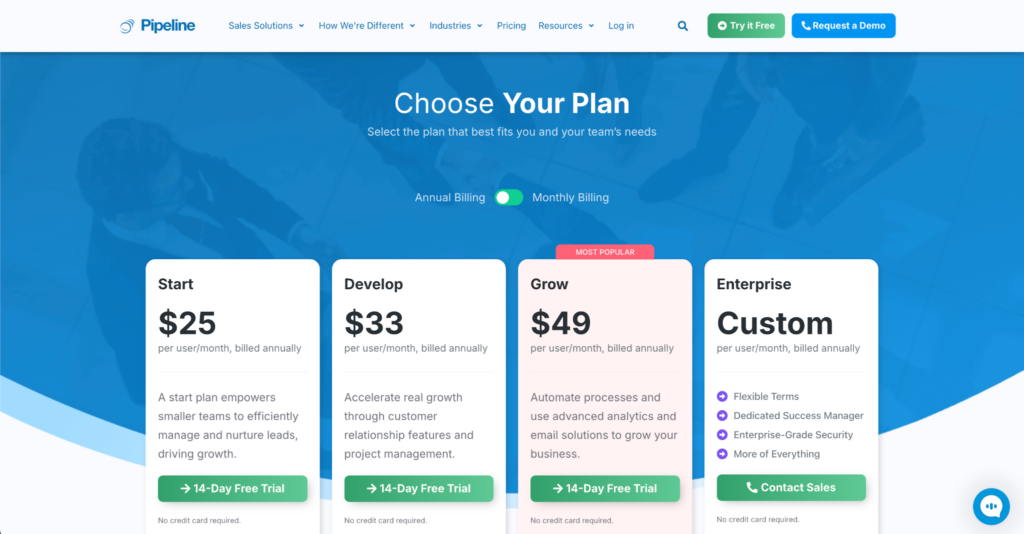
Compared to Monday CRM and Close CRM, Pipeline CRM is more cost-effective overall:
- While Close CRM offers similar features, Pipeline CRM provides these at nearly half the price ($49 vs. $25).
- Compared to Monday CRM, Pipeline CRM’s slightly higher cost comes with more advanced features and greater reliability.
Pipeline CRM ensures that your sales team has access to the best tools for sales pipeline management, allowing them to grow without needing to switch to a different CRM as your business scales.
Pipeline CRM: The Best Sales CRM Alternatives to Monday CRM and Close CRM
While Monday CRM and Close CRM can be effective CRM tools, they may either lack comprehensive sales features or be too expensive for some businesses. Pipeline CRM offers a compelling CRM alternative, providing powerful features in a user-friendly package at a competitive price.
Try Pipeline CRM today, and let us know what you think!
Monday CRM vs. Close CRM – FAQs
Find answers to common questions about how Monday CRM compared to Close CRM, and Pipeline CRM as the better CRM alternative.
1. What is the Best CRM Alternative to Close CRM?
Pipeline CRM is the best alternative to Close CRM, offering comparable powerful sales features without the hefty price tag. It not only supports your sales team through advanced sales outreach channels (such as emails and phone calls), but it also provides a user-friendly interface that makes it a strong contender for businesses seeking a Close CRM alternative.
2. Close CRM vs. Monday CRM, Which CRM is Better?
For businesses seeking a CRM with robust sales outreach options like emails, calls, and texts, Close CRM is a viable choice. However, if budget constraints and a less complex sales pipeline are factors, Monday CRM might be a suitable alternative. That said, Pipeline CRM offers a more comprehensive and affordable solution, combining powerful features without compromising on quality. Explore Pipeline CRM’s full range of features here.
3. What to Consider When Choosing CRM Software for Small Businesses?
When choosing CRM software for a small business, consider these key factors:
- Sales automation: automate repetitive tasks to increase efficiency and focus on closing deals.
- User-friendliness: choose a CRM with a simple interface and a low learning curve. This will provide a quicker return on investment (ROI).
- Scalability: evaluate whether the CRM can accommodate your business’s growth and whether upgrading to higher tiers is feasible.
- Transparent pricing: ensure there are no hidden costs or add-on services that could increase your expenses.



